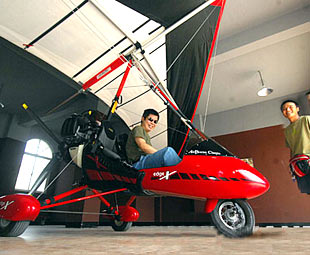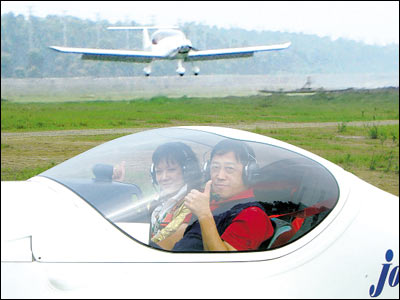| Tools: Save | Print | E-mail | Most Read |
| Hangzhou Welcomes China's First 4S Plane Shop |
| Adjust font size: |
General-purpose aeroplanes include helicopters, police airplanes, agricultural airplanes, private jet with the core business of the Hangzhou 4S Shop is formed by helicopters and private jets although the shop also manufactures gliders. So far, three exhibition halls have been open containing three helicopters are open, for a floor space of 800 square meters. A 160km/h civilian helicopter will lighten the wallet to the tune of 1.2 million yuan (about US$160,000), around the same as a BMW 735Li. The 4S shop's helicopters were all assembled by Xijie Aeroplane Manufacturing Company, a private factory based in Xi'an, capital city of Shaanxi Province, with some spare parts coming from France. Fully operational, they can bear a two-person load on a 400-500km flight. According to industry insiders, insurance for a private jet costing more than a million yuan comes up to 20,000-30,000 yuan (US$2,600-4,000) with a further 1,000-2,000 yuan (US$130-260) to be factored in for each hour of flight. Additionally, annual maintenance costs must be tallied up, although they can run on regular 97# petroleum. The first private jet owner in Zhejiang was Qiu Deyuan, broad chairman of Zhejiang Daoyuan Group. His 65-million-yuan (about US$8.6 million)-Premier I could bear two pilots and six passengers, costing 4000 yuan (US$530) to run per hour of flight. Compared with the United States, which is home to 100,000 private jets and around 270,000 general-purpose planes across 17,000 airports, China counts less than a hundred such, leaving its private jet market yawning. Some Zhejiang real estate developers have sought to get ahead of the game, by including helipads as part of their residential complexes.
Some may see private jets as a sign of opulence alone but their convenience is obvious. On July 11, a Zhejiang businessman, who was injured in a car accident in Inner Mongolia, saved time and likely his life by chartering an executive jet and a helicopter to take him to hospital in Shanghai. Besides medical emergencies, general-purpose planes can also bring enormous aid in patrolling, disaster relief and forest fire prevention scenarios. Currently, the private jet market in Zhejiang is chaotic, said an insider, with no formal airports offering their services and only trial planes being operated. "There is no specific regulation on small planes, and those that do exist for larger craft are insufficient. On top of this, requirements for landing strips are stricter governing small planes," He added. At present all of China's airspace is under military control and general aviation flights must be approved by the air force and Civil Aviation Administration of China (CAAC) beforehand. In most countries where low attitude airspace is open, only general aviation flights need to inform civil aviation authorities of their take-off. For units applying for construction of a helipad, these must meet construction and technical standards and must be approved by local governments, the air force and the CAAC beforehand. However, a CAAC statement dating back to April said China would bring in different control and management rules for different categories of airspaces, such as low and high altitude, by 2010. This would free up the skies for private aircraft. (China.org.cn by Li Shen July 24, 2007) |
| Tools: Save | Print | E-mail | Most Read |
 |
| Related Stories |
|
Product Directory China Search |
Country Search Hot Buys |

